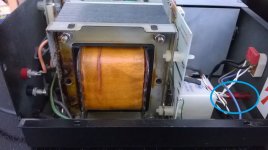Hi guys, recently I bought a second hand amplifier. Everything runs fine except indicator light is not on, so I'm planning to change it. Also I'm going to change power plug as the power cord cannot be changed. I have zero electronic experience but read several chapters of book for electronic dummies. I understand big capacitors in amplifier are dangerous as they store power. Just wondering if I need to discharge them for just replacing the power plug and indicator light? Or is there anything I need to know before my little experiment? I uploaded couple of pictures of amplifier for you guys to have a look, many thanks.
Attachments
You will almost certainly find that the caps discharge within a few seconds of switching the amp off (as they discharge into the circuitry, powering it like a rapidly discharging battery). You can confirm that just by measuring the voltage across them.
Valve amps can be more dangerous because the voltages are much higher and things can stay charged up under some conditions.
If you do ever need to discharge a large cap then use a suitable resistor to do so. Never short them out.
Valve amps can be more dangerous because the voltages are much higher and things can stay charged up under some conditions.
If you do ever need to discharge a large cap then use a suitable resistor to do so. Never short them out.
You will almost certainly find that the caps discharge within a few seconds of switching the amp off (as they discharge into the circuitry, powering it like a rapidly discharging battery). You can confirm that just by measuring the voltage across them.
Valve amps can be more dangerous because the voltages are much higher and things can stay charged up under some conditions.
If you do ever need to discharge a large cap then use a suitable resistor to do so. Never short them out.
I have no resistor or knowledge to do that😕
This is a bad starting point to modify an existing ampI have no resistor or knowledge to do that😕
Well I don't think you need do that here. The voltage across the caps will fall very quickly once the amp is off.
You should however prove that to yourself by checking with a meter and quickly measuring the voltage across each of the large caps.
A suitable resistor would typically be something like a 10k (10,000) ohms 3 or 5 watt part with leads and croc clips. Again, you should always confirm the voltage has fallen before sticking fingers across a cap.
(the voltage will 'never' fall to 0.00 volts for various reasons but it will drop to a couple of volts very quickly... and that's safe of course)
You should however prove that to yourself by checking with a meter and quickly measuring the voltage across each of the large caps.
A suitable resistor would typically be something like a 10k (10,000) ohms 3 or 5 watt part with leads and croc clips. Again, you should always confirm the voltage has fallen before sticking fingers across a cap.
(the voltage will 'never' fall to 0.00 volts for various reasons but it will drop to a couple of volts very quickly... and that's safe of course)
Well I don't think you need do that here. The voltage across the caps will fall very quickly once the amp is off.
You should however prove that to yourself by checking with a meter and quickly measuring the voltage across each of the large caps.
A suitable resistor would typically be something like a 10k (10,000) ohms 3 or 5 watt part with leads and croc clips. Again, you should always confirm the voltage has fallen before sticking fingers across a cap.
(the voltage will 'never' fall to 0.00 volts for various reasons but it will drop to a couple of volts very quickly... and that's safe of course)
Thanks so much for the tips. I will just replace the indicator light and power plug, so wont stick finger around a cap at all actually.
This is a bad starting point to modify an existing amp
I really want to learn enough to manipulate an amp, lacking time, money and space is frustrating.
Well that's good, and you have to start somewhere. Safety is important but to cover it all is a big subject.
Golden rules are to make sure the amp is unplugged when beginning work, and if you must work with it powered up, always use just one hand when delving inside.
If you accidently touch something live, you don't want to have that current flowing across your chest. DC current causes muscles to contract and if the voltage were high enough (such as in a valve amp) then you might find you couldn't let go. Its so easy to have one hand on a metal chassis and the other to accidently touch something. So begin as you mean to go on. One hand only and don't have the other contact anything else that could complete a circuit.
A shock across the fingers is unpleasant, but if its going to happen then that's the way you want it. 30, 40, 50 volts you would certainly feel. I'm not sure what the legal limits are but even 30 volts or so DC could in extreme cases (wet body) be life threatening if it were across the body from arm to arm.
Work safely... learn and above all enjoy 🙂
Golden rules are to make sure the amp is unplugged when beginning work, and if you must work with it powered up, always use just one hand when delving inside.
If you accidently touch something live, you don't want to have that current flowing across your chest. DC current causes muscles to contract and if the voltage were high enough (such as in a valve amp) then you might find you couldn't let go. Its so easy to have one hand on a metal chassis and the other to accidently touch something. So begin as you mean to go on. One hand only and don't have the other contact anything else that could complete a circuit.
A shock across the fingers is unpleasant, but if its going to happen then that's the way you want it. 30, 40, 50 volts you would certainly feel. I'm not sure what the legal limits are but even 30 volts or so DC could in extreme cases (wet body) be life threatening if it were across the body from arm to arm.
Work safely... learn and above all enjoy 🙂
Transistor amplifiers discharge pretty quickly.
Its valve amps that are dangerous as they can hold voltage for a long time.
I once discharged a valve pre amp before working on it.
I still got a shock. I had forgotten to turn it off !
Its valve amps that are dangerous as they can hold voltage for a long time.
I once discharged a valve pre amp before working on it.
I still got a shock. I had forgotten to turn it off !
- Status
- Not open for further replies.
- Home
- Amplifiers
- Solid State
- Easy question for you guys


